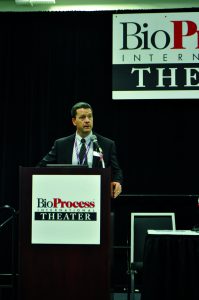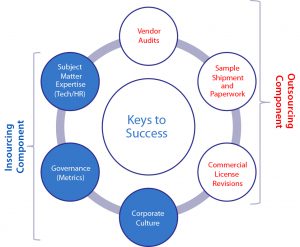Greg Beattie (corporate vice president for global insourcing solutions and research support services, Charles River Laboratories), BPI Theater @ BIO June 8, 2016, 2:00–2:20 pm
 When you think of Charles River Laboratories,” Beattie began by asking, “do you associate it with anything other than rodents?” The company is very well known for selling rats and mice. However, it is also one of the world’s largest outsourcers in the biological testing field. The company is also one of the largest “insourcing” companies: It has 800 employees spread over 70 different contracts in Europe and North America.
When you think of Charles River Laboratories,” Beattie began by asking, “do you associate it with anything other than rodents?” The company is very well known for selling rats and mice. However, it is also one of the world’s largest outsourcers in the biological testing field. The company is also one of the largest “insourcing” companies: It has 800 employees spread over 70 different contracts in Europe and North America.
Insourcing is an alternative to outsourcing and a way to leverage internal capacities by bringing in a provider who can conduct testing within the client’s own physical location. Reasons to insource include maintaining internal control and oversight. An outsource can be looked at as an extension of a client’s organization, but insourcing offers direct control while providing needed expertise.
Key considerations when outsourcing bioprocess-related work are ensuring regulatory compliance, having robust documentation processes and sample transfer, and concerns over commercial licensing. Developers don’t have such worries when they insource.

Beattie offered an example of insourcing in which a major pharmaceutical company needed more space and technical expertise. Charles River Laboratories is currently building a facility for that client and has transferred some of its employees to this facility to provide oversight and control. Beattie’s company is leveraging staff and facilities by “right-sourcing,” what he calls the perfect model of in-and outsourcing, to provide this client with a cost-effective and flexible work force.
Asked why a development company should choose to insource, Beattie pointed to the critical element of flexibility. Charles River Laboratories can move quickly to adapt to surge and flex capacity as needed. It provides depth in technical expertise, human resources, training, quality assurance, and advice. If a developer has the infrastructure itself but not the talent, he pointed out, then why should it outsource and pay for someone else’s infrastructure? Insourcing can leverage the resources you already have, and you will maintain greater control over intellectual property. With Charles River Laboratories, clients have the option of outsourcing to the contract testing organization’s facilities during peak demand in addition to insourcing.
Can you comment on risks with insourcing? In well-publicized lawsuits, companies have brought contractors into their facilities and treated them as “second-class citizens.” They were treated differently and paid in a way that was against the law, leading to some companies being fined. When choosing an insource provider, a client should make sure that it is following all applicable laws and that its contractor has experience with insourcing across multiple nations.
Listen to the full presentation at www.bioprocessintl.com/BIO2016
